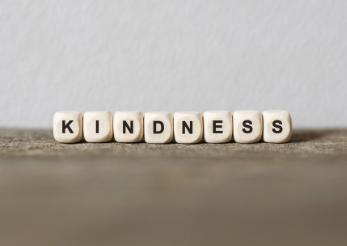“It Shouldn’t Have To Happen to You To Matter to You”

Michail Petrov/Shutterstock
At a time when many of us feel fatigue from the incivility we hear on the news or see on social media (or maybe even at what you thought would be a friendly dinner), the call to lead with kindness in our workplaces and daily lives is critical.
At the recent , keynote speaker, Shola Richards, reminded us that "being kind isn't always easy." I had to reflect on those words because I thought being kind was relatively simple. I can hold a door, extend a smile, or compliment a stranger on the fantastic shoes she's wearing. But after reflecting more, I realized that deeper kindness often demands courage, empathy, and sometimes hard decisions to stand up for oneself or others in difficult situations.
What Is Kindness?
According to the , kindness is a "benevolent and helpful action intentionally directed toward another person...motivated by the desire to help another, not to gain explicit reward or to avoid explicit punishment." However, in practice, kindness is more complex. What one person defines as kind may not align with how others see acts of kindness, so that is why being open to other perspectives and practicing patience matters.
Richards' message encouraged us to look at actions of kindness that take strength even though it may sometimes be uncomfortable. What if you witness a colleague being belittled? What if you hear your supervisor say a person doesn't deserve to lead that project because she is an emotional woman? Or a team member is intentionally left out of meetings or made fun of because of his accent? It isn't always easy to stand up in challenging situations, but that's when kindness is needed most.
The Kindness Paradox
Most of us believe that we are doing our part in creating a kind workplace and a kinder world. According to a recent "nearly all Americans see themselves as civil, but just a quarter see society as civil." How is there such a disconnect?
The "" reminds us that we tend to judge ourselves by our intentions and others by their actions as outlined by Stephen M.R. Covey. In other words, we may think we are being compassionate, but a combination of factors (such as being spread too thin with our department role, balancing obligations at home, stressing about finances, and constantly being exposed to negativity) may make us significantly less compassionate than we think.
A powerful statement that stayed with me from that final keynote was when Richards said, "It shouldn't have to happen to you to matter to you."
This statement summarizes the goal of many colleges and universities well. In higher ed, we talk about creating a sense of belonging for our students and colleagues, being inclusive of all, and having empathy towards others.
In order to do that, we must stand up against intolerance and set boundaries even when it isn't always convenient or personally affecting you. Sometimes people think that if it isn't happening to them, why should they care? It is "messy" or "awkward," or it is an "HR problem to handle." The reality is that we all need to do our part in promoting a kind workplace. It takes strength to be a compassionate co-worker, leader, or friend.
Building Strength To Be Kind
Richards explored why kindness sometimes feels difficult and suggested ways to strengthen our capacity for kindness. Here are some common feelings that arise and how you might counteract them.
Common Feeling: I'm too overwhelmed or too burned out to think about kindness.
Action: Look within yourself.
- Commit to taking care of yourself. When we prioritize our well-being, we are better equipped to be kind and helpful to others. As Richards said, "Ignoring your mental health is like saying you're too busy driving to stop and get gas." Don't run out of your mental fuel.
- Evaluate your relationships. There may be someone in your life who has hurt you. Forgive them. Forgiving is not a sign of weakness or a gift to them. It is a gift of peace to yourself.
- Do something today that your future self will appreciate. Think about your actions today and how they can shape you.
Common Feeling: I'm only one person -- how can I really make a difference?
Action: Start small, today.
- You don't have to plan out ways you can be kind for weeks, months, or years to come. Start small and just do one kind thing, today. (But then when tomorrow comes, just do it today.)
- Consider Kossip! That isn't a typo. Talk kindly about someone when they aren't in the room. Spread messages of kindness when they aren't around. What a compliment that is, and positive words can be contagious!
Common Feeling: I'm not willing to risk a relationship, career, safety, etc. to stand against unkindness.
Action: Go First
- Stepping up isn't easy, but be courageous and step out of your comfort zone. Kindness doesn't always require confrontation. You can influence change by leading with compassion, listening, and seeking support. It is ok to recognize your limits and choose when to engage (or not) to protect your safety.
The Takeaway
Being kind isn't about being perfect; it's about having the right intentions-and caring about what's happening with others, not just what directly affects you. It is about showing up even when it is uncomfortable or inconvenient. As Richards said, "Do something that will make the future you love you."
As Nobel Peace Prize recipient and human rights champion, Desmond Tutu, reminds us, "Do your little bit of good where you are; it's those little bits of good put together that overwhelm the world."
